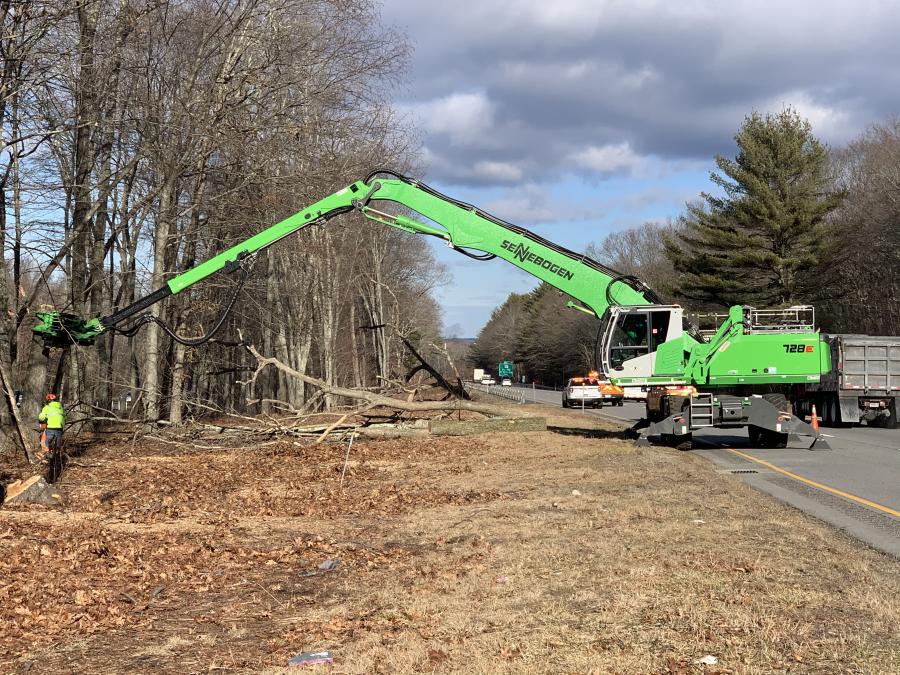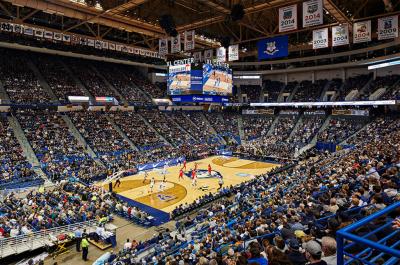CEG photo
SENNEBOGEN model 728E cutting along a Connecticut interstate.
Distinctive Tree Care, which provides high quality tree care and arboricultural services in Connecticut and Massachusetts, was founded by Jason Yerke in 2004. Yerke, who owned a landscape company — Distinctive Gardens — invested in a bucket truck, an older dump truck and a chipper and put together a small tree crew that would become Distinctive Tree Care.
By 2011, following major storms the year prior that dramatically increased the need for tree cleanup, Yerke had a crew of 20 working on Distinctive Tree Care; the landscape side of the company had taken a back seat. Yerke also discovered that the profitability of his company was much higher doing tree work than landscaping. He was able to keep a tree crew working far more hours and under far more weather conditions than a landscape crew.
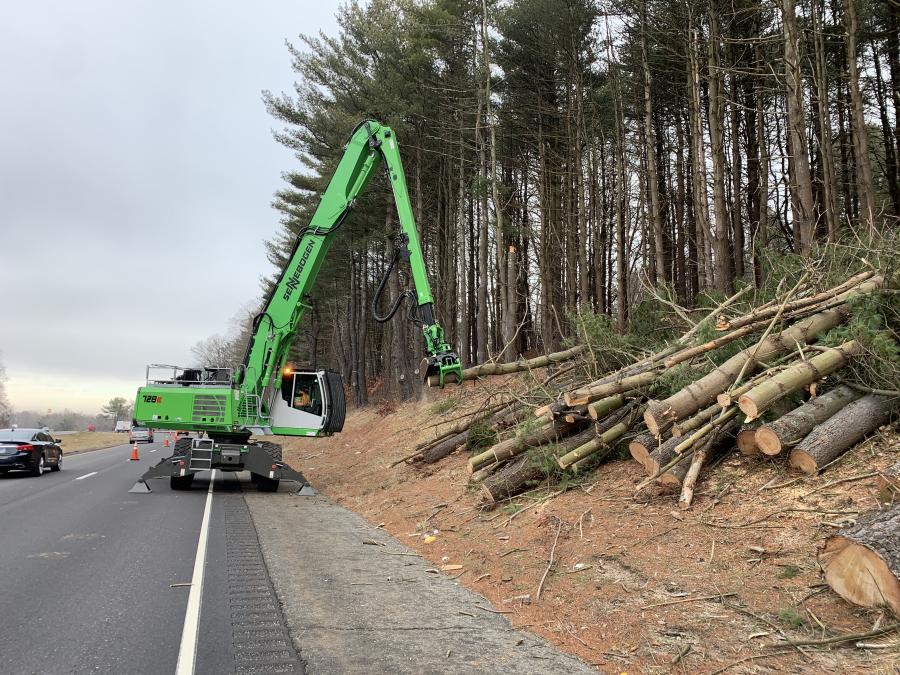
CEG photo
In 2016, Distinctive Tree Care saw something developing on the horizon that was going to change everything: the invasion of the gypsy moth. Connecticut is almost 70 percent forested, and those forests extend over people's homes and subdivisions.
The gypsy moth turns into an ugly caterpillar that will literally completely defoliate a tree and ultimately kill it if the tree is not sprayed. At the same time, the area was hit with a severe drought. The gypsy moth, which particularly focused its attention on oak trees, would not necessarily deal a death blow, but, with the combination of the drought, oak trees started to die across the state by the tens of thousands.
In 2017, the same scenario recurred when the emerald ash borer started to thrive in southern New England, which would ultimately kill nearly 80 percent of the ash trees. It became evident that a faster, more efficient way than the traditional bucket truck, ropes and tackle needed to be developed if Distinctive Tree Care was going to keep up with the demand for taking down trees. The company purchased a 45-ton crane with a 127-ft. stick and it improved the situation, but it was hardly revolutionary and it wasn't getting them where they wanted to go, Yerke said.
Yerke started doing some research looking for new methodology. What he saw was an approach being used in Europe where excavators with some sort of attachment would allow operators to grab and cut the tree and then move the tree with the excavator. But since the typical oak and ash trees he was dealing with can grow up to 80 and even 100 ft., Yerke didn't see a traditional excavator being the ideal way to handle that, considering at times he also would need significant reach to get to the tree.
In 2017, Yerke attended a show in Columbus, Ohio, and came across an exhibit with a SENNEBOGEN model 718.
"This excavator was huge, it was on wheels, and it had a head on it that was exactly what I was looking for, grip wood and cut it all in the same process," he said. "Parked right next to it was a chipper the size of a bus, an Albach, and it would literally drive itself to a job site, open up, grab all the wood and feed itself, chip it and feed the chips into a truck.
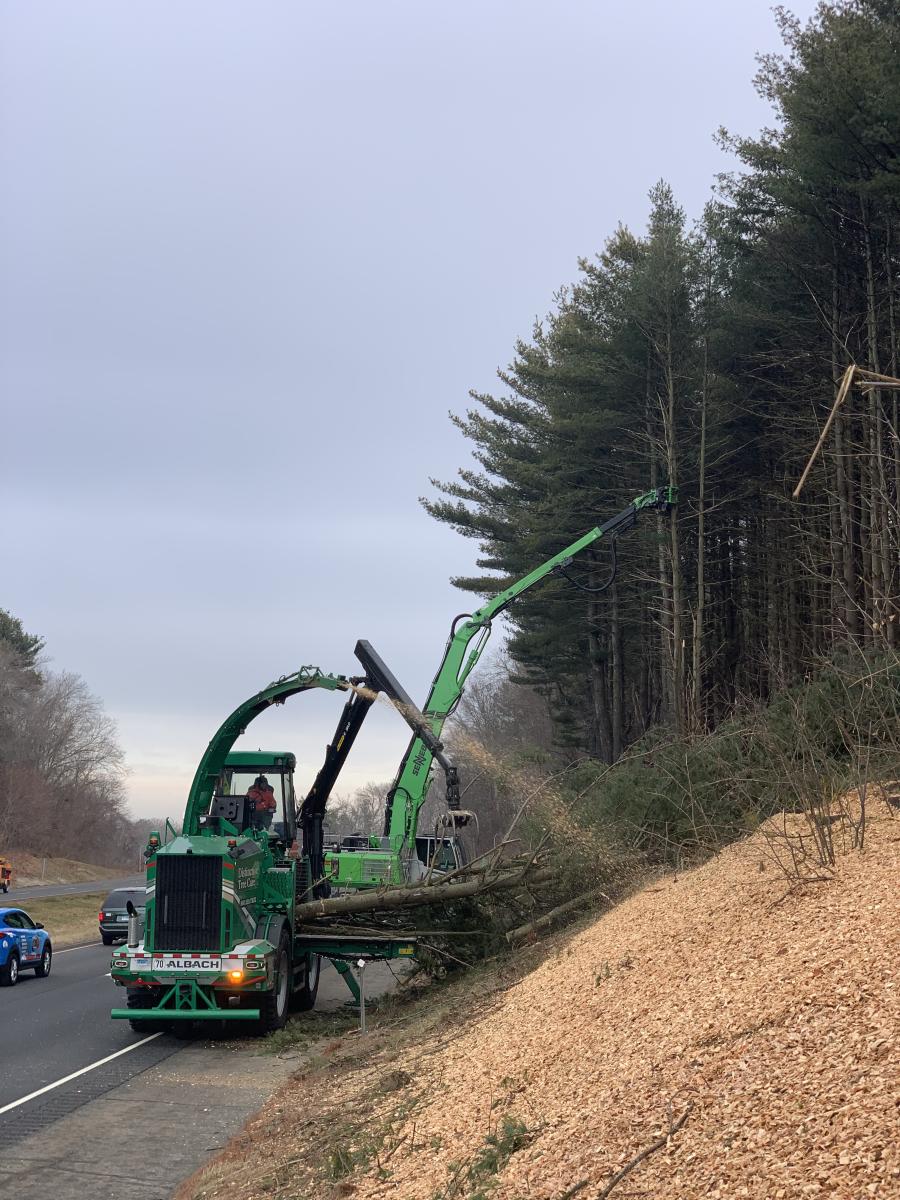
CEG photo
"Think about what an excavator is designed to do," he added. "Essentially, it's built to dig below surface. They have different breakout points, strengths and configurations, all to dig underground. Material handlers like a SENNEBOGEN are designed to lift things up, to move and rotate and do multiple functions above ground. It also has much greater hydraulic flow for attachments which is acutely necessary for the type of attachments we are using here.
"This setup [with SENNEBOGEN] gave me everything that I was looking for — a tremendous reach of over 40 feet, an attachment that is a grapple and saw all in one, and a chipper that would give me volume like I'd never seen before. I became engaged in a conversation that showed I had real interest and the company demonstrating the SENNEBOGEN offered to do a demo on a job that I had bid on. It was essentially a $30,000 job that would take me about 10 days. They came in with their equipment and finished it in three days.The trees came down like nothing I had ever seen before; the chipper was filling a tractor trailer instead of a dump truck. Needless to say, when they were done, I was sold. I bought the used chipper on the spot and ordered a new SENNEBOGEN 718."
Yerke's next challenge was to develop the right markets and applications for the SENNEBOGEN.
"It's really not an ideal machine for residential situations, it's a heavy machine," he said. "One mistake and you could destroy somebody's lawn, not to mention their driveway."
So, Yerke went to the Connecticut Department of Transportation and offered them a demonstration.
"We took the Albach and the SENNEBOGEN to areas where trees had grown over the sound barrier and were leaning in, and we were able to effortlessly eliminate those trees faster and easier than had ever been done before. It became evident that we would easily be able to remove trees along the highway using the SENNEBOGEN and its tremendous reach and the high-speed chipper faster and easier than anything the DOT had ever seen before with barely disrupting traffic flow at all.
"There was a little bit of a learning curve for my people to learn how to operate these machines, but the company gave us great support and training and in under 100 hours, our operators were running them like experts. The state liked what they saw, but they had to put the application out for a special bid. I was the only one who could bid on it because I'm the only one who had that type of equipment. The rest is history."
The demand was so high with the DOT work Distinctive Tree Care went from running one SENNEBOGEN to a fleet of nine. The company also gave input during that period that helped develop a larger machine for the same application, the SENNEBOGEN model 728, which expanded the reach capacity to 67 ft. of reach and has become a mainstay for DOT roadwork.
"We now have crews set up in every one of the four districts of Connecticut DOT because exactly what we predicted would happen is happening as a result of the gypsy moth and ash borer. Trees along roadsides are dying at an astounding rate and it has to be cleaned up. When trees start to lean or fall, they are a danger to power lines, or they impact the line of sight. Trees in the wrong spot along the road can create shade where ice won't melt when it should. So, in those cases we're not clearing out necessarily dead trees, but we are doing tree management for the state.
"When we send out a crew to do state work, we have to send two or more SENNEBOGEN machines at a time. The primary reason being that one SENNEBOGEN cannot possibly cut fast enough to optimize the tremendous volume that our chipper can handle. Otherwise, the chipper is sitting their idling and it not productive for the customer."
In 2021, Yerke built a purpose-built shop specifically designed to house and maintain its SENNEBOGEN fleet.
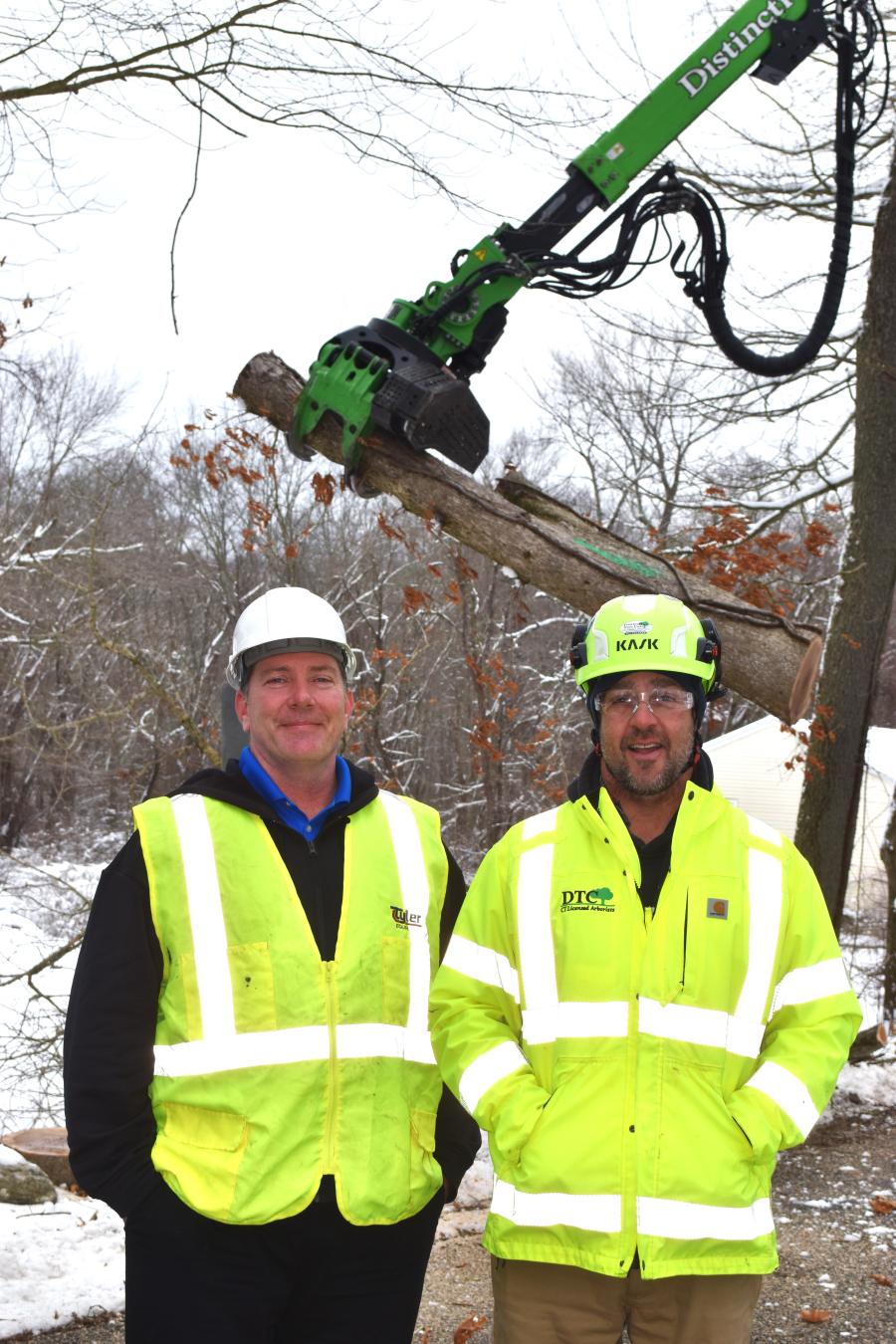
CEG photo
"We have purchased all of these SENNEBOGEN machines from our local dealer, Tyler Equipment. When we first started, out Tyler was doing all of the service work on our machines. Now, with nine machines, we have brought mechanics on board to handle daily maintenance, but we still rely heavily on Tyler Equipment for support. Their knowledge of the machines and their parts inventory has been invaluable to us.
"The SENNEBOGEN machines are German engineered. Their performance is astounding. They rarely give us any failures and when they do, it typically turns out to be something very simple. Like anything else you would associate with German manufacturing, they are extremely well built.
"Tyler Equipment being local to us made the SENNEBOGEN decision easy. Tyler gives us that local service that we're looking for, and when we first started purchasing from Tyler, their local representative was Bill O'Keefe. He did such a wonderful job representing the SENNEBOGEN product with Tyler Equipment. He is now working for SENNEBOGEN. He is very passionate about the brand and gave us a great education on properly using the product. Tyler Equipment and SENNEBOGEN work well together to make the customer experience special. I've been over to Germany several times for training and on one trip we actually met Erich Sennebogen."
There is another application that Yerke has developed a market for, particularly with the DOT projects: he can put a mower attachment on the SENNEBOGEN and mow extreme banks along the roadside. It also will mow heavy brush.
Yerke also appreciates the extreme visibility of the cab design. With a SENNEBOGEN, as is the case with most material handlers, the cab will actually elevate, giving the operator a much better view.
Blazing a Trail to Distinctive Tree Care
Distinctive Tree Care's founder, Jason Yerke, followed a path that was destined to lead him to the decision to start the company in 2004.
When he was in high school, Yerke wanted to be a fruit farmer just like his grandfather, who had been a role model for him and owned a 70-acre farming operation in Massachusetts where he grew apples, peaches, plums, pears, etc. To follow that path, Yerke chose to take vocational classes in high school to lay that foundation. At 15, he learned that his grandfather was selling that farm, and he was crushed. At that time an advisor in school pointed him toward an alternative direction with the skills that he was learning and suggested that he consider landscaping.
Having made that decision while continuing his education, Yerke started a lawn mowing business in his spare time. He was able to borrow $400 and buy a lawn mower and leaf blower. He was living in an area that was heavily forested and had a lot of subdivisions, so at the age of 15 he quickly found himself making decent money and growing a business.
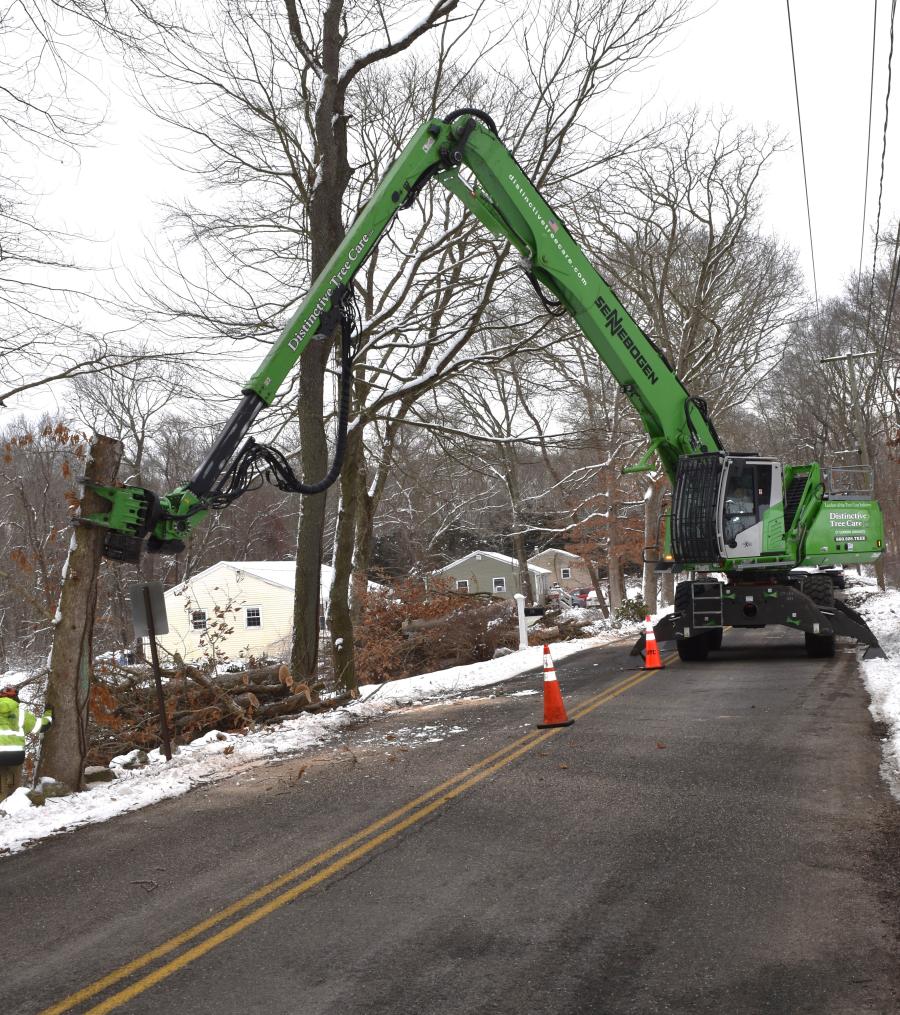
CEG photo
In 1985, Hurricane Gloria blew through, taking trees down along its path. With the help of his mother, he purchased a chainsaw and quickly shifted from blowing leaves to cutting and splitting firewood.
"We were too young to cut trees down, but we weren't too young to cut them up and sell firewood," said Yerke.
By 16, he was old enough to get his driver's license and start expanding his lawn care service; by 18 he had a business with more than 300 customers.
Yerke graduated from high school and, even though he had a nice business started, he was advised to continue his education. He attended the University of Massachusetts at Amherst, where he majored in arboriculture and urban forestry.
When Yerke completed college, he wanted to apply what he had learned about trees, which really didn't have any application to his landscape business. He had a fascination with equipment that went back to his days on his grandfather's farm operating all kinds of tractors and harvesting equipment, so he decided to take a position with Asplundh, one of the largest tree companies in the country.
He became a certified arborist in Massachusetts and Connecticut and a certified arborist in the International Society of Arbor Culture. He stayed with Asplundh for the next five or six years, quicky moving up through the chain of command. Asplundh was focused on doing strictly commercial work, but, at age 25, Yerke convinced them to allow him to start a residential division of the company, which quickly prospered. Meanwhile, he was still running his landscape business on the side.
In 1997, Yerke decided that he was trying to manage too many things at once and tendered his resignation with Asplundh. He rebranded his landscape company as Distinctive Gardens and timed the market perfectly, as high-end residential construction was booming as well as the demand for extensive landscape and hardscape. It wasn't long before he had a dozen employees working for him and they were tackling $200,000 landscape projects.
In 2004, with some excess cash flow, Yerke invested in a bucket truck, an older dump truck and a chipper. He put together a small tree crew and started Distinctive Tree Care.
CEG
This story also appears on Forestry Equipment Guide.
Today's top stories



